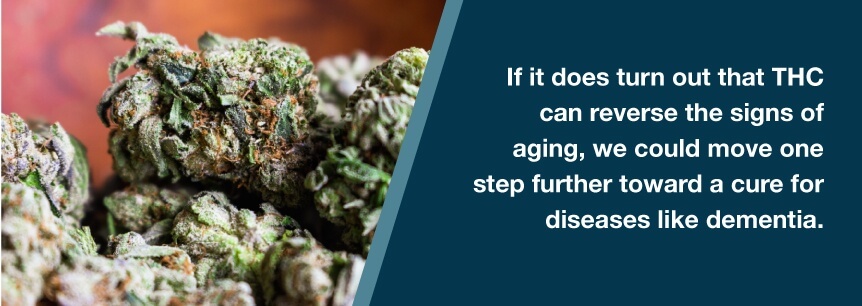
At MarijuanaDoctors.com, we like to discuss the use of medical marijuana to help senior patients. Older adults have unique needs that cannabis can meet with few drawbacks. We already know marijuana medicine can relieve a wide range of ailments and symptoms. But, research indicates it could do even more for the elderly. Researchers discovered the cannabinoid THC could reverse the effects of aging on a person’s memory. This evidence could help us understand how to use medical marijuana to improve elderly memory.
Andreas Zimmer, a molecular psychologist from Germany, has extensive experience investigating cannabinoids. The cannabis plant has more than 85 of these compounds, and each one has something to offer to our health. Any studies done on cannabinoids have broad implications for marijuana research. Experts mainly examine tetrahydrocannabinol (THC) and cannabidiol (CBD), the two most prominent cannabinoids, in their studies. Zimmer relied on his previous research experience with cannabinoids to lead this study’s alongside many other academics.
Zimmer worked with his colleagues at the University of Bonn and researchers from Hebrew University in Jerusalem. In this study, they planned to build on Zimmer’s previous research on the endocannabinoid system (ECS), which makes and uses cannabinoids to trigger bodily functions. Previous research conducted by Zimmer suggested that ECS activity goes down as the brain ages. Could those results mean that increasing ECS activity reverses brain deterioration? Zimmer and his team wanted to find out the answer to this question.
The researchers worked with young (two months), mature (12 months) and aged (18 months) mice for this study. Mice in the test group received an implant that slowly released THC in their systems. They went through this treatment for 28 days and had a washout period of a few days. During this washout period, the mice received nothing.
Every group of mice participated in memory and learning behavioral tests after receiving THC or a placebo. One exercise involved recognizing other mice the researchers exposed them to before dosing. The subjects also completed an activity where they looked for a safe platform in a water pool. During these tests, the researchers measured how long it took to get back on the platform and recorded the mice’s reactions to other mice and objects.
Since the aged mice did not go through all the activities, the research team found most of their results in the mature group. While the young mice had impaired memory function after taking THC, the mature mice had improved memory. In fact, they had almost identical results to the young mice. Why? Because they had young-looking brains.
When the team looked at the high performers’ brains, they discovered cell structures that looked young. Each THC-treated mouse’s hippocampus grew additional synaptic spines. These proteins allow neurons to communicate with each other, so more synaptic spines mean more brain activity. The THC also activated genes that supported neurons and deactivated genes that expressed cell death. Through a process called histone modifications, the THC rewrote their genetics.
The researchers confirmed these happenings using a process of elimination. They repeated the trials with a new group of mature mice. This time, however, they gave the mice medication that blocks histone modifications. When they completed the memory exercises, they had no improved performance. After verifying the histone modification, the team inhibited the mice’s CB1 receptors. These receptors use THC to change our bodies. When the mice didn’t have CB1 receptors, they also didn’t have any THC-related improvements.
After making these connections, the research team concluded that restoring CB1 signals could treat age-related cognitive problems. According to Scientific American, they plan to build even further on these results in the future. Zimmer and his colleagues will examine the effects of THC on older adults with cognitive impairments.
These results have plenty of promise for future research on THC and the aging brain. However, we need to keep in mind that they act as only the first step in a long journey. We can’t make conclusions about THC’s effects on human brains just yet. While the study had a well-developed design, the researcher’s couldn’t avoid the fact that the subjects weren’t human. Mice and other test animals give us a starting point so we can determine what we can safely test with humans. Considering this study led to research involving people, we’d say they succeeded. But, we can’t apply these findings to humans just yet.
As many medical marijuana-related studies show, these findings prove that we need more research. Due to the stigma surrounding marijuana across the world, we don’t have much data on cannabis’ uses for health. Fortunately, the research mentioned in this blog post happened in Germany instead of the United States. In America, scientists can’t do much research on marijuana because of drug scheduling. Meanwhile, Zimmer’s team already has the funding to observe THC in human brains. This study could lead to a breakthrough in the treatment of cognitive decline.

If it does turn out that THC can reverse the signs of aging, we could move one step further toward a cure for diseases like dementia. While memory loss makes up only one symptom of these conditions, its reversal makes a great start. Plus, this treatment would improve the quality of life of older people with slight memory loss. In the case that Zimmer’s team doesn’t find anything, we have more data on medical marijuana. We make progress no matter what happens.
Did this blog post make you want to read more about medicinal cannabis studies? We have even more knowledge for you. Our case studies cover the most prominent research on medical marijuana for numerous conditions. To continue learning about cannabis medicine and cognitive decline, check out our Alzheimer’s disease case studies.
MarijuanaDoctors.com also helps you learn about your own memory symptoms. If you want to get personalized advice on medicinal cannabis, visit a marijuana-positive doctor today.
No Information on MarijuanaDoctors.Com should be used to diagnose, treat, prevent or cure any disease or condition. You can view our Full Disclaimer here.